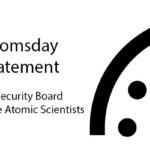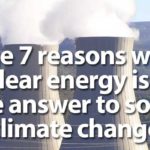As advocates and lawmakers warn about the expiration of a key arms-control treaty, the administration appears paralyzed over its approach.
By NAHAL TOOSI
Aides to President Donald Trump want to name a high-level negotiator to oversee nuclear talks with Moscow, former U.S. officials say – an effort that may be delaying a Trump decision on whether to extend America’s last major arms control treaty with Russia.
The negotiator would act as a special envoy focused on arms control talks. And while Moscow would likely be his or her primary overseas negotiating partner, Trump may insist that the envoy take on the even harder task of convincing China to engage in such discussions.
So far, the administration has been unable to find someone willing to take the position, two former U.S. officials told POLITICO. The search has been going on since late last year.
Names floated for the role include: former ambassador and nuclear negotiator Richard Burt; Treasury Department official Marshall Billingslea; and former George W. Bush national security adviser Stephen Hadley, according to various sources. Burt declined comment; Hadley and Billingslea did not reply to emails seeking comment.
Trump, meanwhile, faces growing pressure to agree to extend the New START Treaty, a landmark Barack Obama administration arms control agreement that took effect in 2011. The treaty limits the United States and Russia each to 1,550 deployed long-range nuclear warheads and 700 long-range delivery vehicles. Advocates for its renewal are arguing in increasingly strident terms that dire consequences could follow if it is allowed to expire next February.
U.S. lawmakers from both parties have introduced legislation designed to push Trump to extend the existing accord. The Russian government has said repeatedly it’s happy to extend the treaty for five years without conditions.
Former U.S. officials also have added their voices to the effort, insisting that Trump should not waste time. An extension wouldn’t require congressional approval, and could remain in effect while talks on a replacement deal are ongoing.
“The treaty’s agreed limits on nuclear arsenals are too important to be put at risk in a game of nuclear chicken,” former U.S. Secretary of State Madeleine Albright and former Russian foreign minister Igor Ivanov wrote in a Monday op-ed urging extension.
And U.S. allies have likewise expressed their alarm. In a recent speech laying out his nuclear doctrine, French President Emmanuel Macron urged New START’s renewal and warned of “the possibility of a pure and unrestrained military and nuclear competition, the likes of which we haven’t seen since the end of the 1960s.”
But Trump is suspicious of the merits of the treaty. He has complained that the pact is not comprehensive enough, and also said it should include Beijing, given China’s reportedly growing nuclear arsenal.
Reuters reported that when Russian leader Vladimir Putin raised the possibility of extending New START with Trump in January 2017, the new U.S. president first paused to ask his aides what it was. He then denounced it to Putin as a bad deal negotiated by Obama.
Trump has at times made it clear he isn’t keen on limiting America’s nuclear prowess. Weeks before his inauguration, he tweeted: “The United States must greatly strengthen and expand its nuclear capability until such time as the world comes to its senses regarding nukes.”
For now, the president appears inclined to use the possibility of an extension as leverage to push Russia to agree to broader nuclear talks. His newly proposed budget requests billions to modernize America’s nuclear arsenal, another signal to Moscow that the U.S. won’t be cowed.
Trump’s hardline approach has its defenders, including hawkish lawmakers such as Sen. Tom Cotton of Arkansas and Rep. Liz Cheney of Wyoming, who have pushed legislation to withhold funds from an extension unless the treaty covers more of Russia’s arsenal and includes China.
This side argues that arms control agreements such as New START are outdated in part because they do not account for non-strategic or “tactical” nuclear weapons – including ones that cover a shorter range. Russia has a significant stockpile of such nukes.
Russia also faces a cash crunch, this side argues, so it has an interest in seeing the U.S. extend the limits in New START. “The Russians are seeing that the treaty is the only thing restricting the Americans,” a former senior Defense Department official said.
They also note that Trump’s unwillingness to go along with Russia’s call for an extension contradicts the narrative that he’s too eager to please Putin.
Tim Morrison, a former senior National Security Council official who worked on arms control issues, is among those urging Trump to use the extension as leverage. In an interview, Morrison urged advocates of an extension to “stop playing into the Russian propaganda” — arguing that there’s plenty of time.
“The treaty doesn’t expire for another year,” he said. “Why all the agonizing when there’s an opportunity for a better deal?”
Advocates of a New START extension counter that it’s better to do so now for a number of reasons.
For one thing, it will offer the U.S. and Russia a sense of stability to know that treaty will stay in force, and allow them to better plan for future talks and adjustments to their arsenals. For another, it’s tough to predict what the geopolitical situation will be months from now, and the U.S. and Russia already are at loggerheads over many other issues.
The Russians might even try to use the ticking clock as leverage over Washington if Trump takes too long, one former senior U.S. official warned.
There’s also the possibility that Trump may choose not to extend the treaty at all, believing that a vacuum in the U.S.-Russian arms control space could act as leverage, too.
“Part of the concern is that this administration bungles this decision to extend because of ineptitude or simple chaos,” said Daryl Kimball, executive director of the Arms Control Association. “There is a value in providing the assurance that there will be at least some basic limitations. It assures allies, it assures adversaries, and it allows us to focus our energy and engagement with Russia and potentially with China to talk about what happens next.”
Military officials have also warned that the treaty’s expiration would complicate their efforts to keep tabs on Russia’s nuclear arsenal.
“When it comes to the New START treaty, from a STRATCOM perspective, we like the idea of arms control agreements, particularly with Russia, that provide us with some level of assurance that at least a portion of their nuclear forces are capped,” Vice Adm. David Kriete, the deputy head of Strategic Command, said in July. “So we kinda know what we have and what we are dealing with, and then we can plan accordingly.”
Trump’s handling of the New START issue echoes how he dealt with the Iran nuclear deal, another agreement reached under the Obama administration.
Trump insisted the Iran deal, which curbed Iran’s nuclear program in exchange for sanctions relief, was too narrow. He abandoned it and imposed new sanctions in hopes of forcing Tehran to negotiate a better deal. But so far, he’s been unable to bring Iran’s leaders to the table.
Some nuclear observers say Trump’s reaction to New START is simply par for the course given his instinctive dislike of any policy championed by Obama. There’s even a possibility that Trump won’t decide on an extension until after the November election, avoiding placing his imprimatur on an Obama-era deal ahead of the vote.
In any case, according to analysts, Capitol Hill aides and others, there’s a sense of paralysis inside the administration now, with no serious plans ready for how to engage Russia or China in any future talks.
It hasn’t helped that Trump has cycled through national security advisers; his fourth, Robert O’Brien, took over in September. O’Brien succeeded John Bolton, a skeptic of arms control deals who had said Trump was unlikely to extend New START because it didn’t cover tactical nuclear weapons.
O’Brien, who does not have comparable experience working on arms control issues, has offered few clues as to what the White House is now thinking about the treaty negotiations.
In remarks Tuesday at the Atlantic Council, he said merely: “We will be negotiating with the Russians on nuclear disarmament issues. And I think that’s something the Russians are interested in and something President Trump is very interested in.”
One key obstacle to any action, including an extension of New START, is the lack of a point person for the negotiations, the former senior Defense Department official said. “I’m told there’s no work going on until they appoint this senior negotiator,” he said.
Under Obama, the New START talks were led on the U.S. side by Rose Gottemoeller, a top official who held titles including undersecretary of State for arms control and international security.
The State Department’s current top arms control official is Assistant Secretary of State Christopher Ford. Ford has been sharply critical of arms control advocates, dismissing many of them as “dim bulbs or apologists” in a recent speech.
In written testimony before the Senate Foreign Relations Committee in December, Ford said the State Department had “convened teams of experts to explore the way forward, including the question of possibly extending New START” but offered few other details.
During the question period with senators, he said the decision about whether to extend the treaty “has not yet been made.”
A House Democratic aide said there have been internal administration discussions on whom to appoint as an envoy going back about two months. A list of potential candidates was sent to Secretary of State Mike Pompeo a few weeks ago, the aide said.
The White House referred POLITICO to the State Department for comment, but the State Department referred back to the White House.
Burt, a longtime advocate of arms control treaties who supports extending New START, would represent a stark departure from Bolton and Morrison’s preferred approach.
While he declined to comment on the envoy position, Burt warned that abandoning New START would be tantamount to disposing of the “last nuclear guardrail.”
“We’ll be back in the 1960s, both sides engaged in a nuclear buildup,” Burt said.
Hadley offered modest support for the treaty during the congressional debate over its passage in 2010, saying it offered “modest but nonetheless useful contribution to the national security of the United States and to international stability.”
Russia and the United States have a long history of engaging in arms control negotiations. While there have been rising tensions on that front – the U.S. quit another nuclear treaty last year after determining Russia was outright violating it – there’s still optimism that the two countries can strike future such agreements.
Far less likely, analysts and former officials say, is that the Chinese will agree to join any such deal. For decades, China has resisted engaging in arms control talks, and Beijing has expressed no interest in responding to Trump’s demand that they do so now.
O’Brien acknowledged as much on Tuesday, remarking flatly, “The Chinese are not interested in arms control.” That comment was a rare direct contradiction of his boss, who claimed erroneously in December that Beijing was “extremely excited about getting involved.”
Russian officials, meanwhile, have said that it’s on the Trump administration to bring in the Chinese. But they’ve added that if Beijing agrees, then the talks should be broadened to include other nuclear powers, such as U.S. allies Britain and France.
“Engaging other nuclear armed countries is a worthy goal, but is undoubtedly complex and time consuming,” Kimball said. “There’s simply no time to conclude a new deal with Russia and-or China before New START is due to expire.”
In an unsigned editorial this week, The Washington Post was far more blunt: “Right now, demanding China be included looks more like a poison pill for New START than a genuine attempt to keep the treaty alive.”
Source: https://www.politico.com/news/2020/02/12/trump-nuclear-envoy-russia-114655


